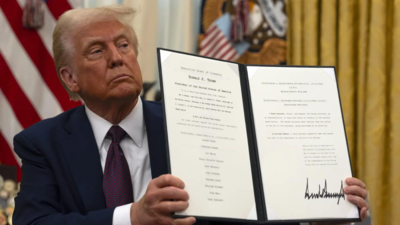A US district court in Washington state has issued a 14-day emergency temporary restraining order pausing implementation of the birthright citizenship Executive Order (EO) signed by President Trump on January 20, 2025.
In general, the EO seeks to deny citizenship by birth to children born in the US after February 19, 2025 without at least one parent being a US citizen or US lawful permanent resident (aka green card holder). This includes children born to undocumented parents as well as to parents in any non immigrant status, including H-1B, L-1 (intracompany transfer), F-1 (students), etc. As mentioned by TOI earlier, this will significantly impact the Indian diaspora in the US.
Mitch Wexler, partner at Fragomen, a global immigration law firm told TOI, “The purpose of the temporary restraining order is to pause implementation of the EO while the district court considers its underlying legality. While the temporary restraining order remains in place, the US government is fully enjoined from enforcing or implementing the EO. The Trump Administration may appeal the restraining order to a higher court.”
Judge John C Coughenour in his order stated: “President Trump and the federal government now seek to impose a modern version of Dred Scott. But nothing in the Constitution grants the President, federal agencies, or anyone else authority to impose conditions on the grant of citizenship to individuals born in the United States. The President’s Executive Order of January 20, 2025—the Citizenship Stripping Order— declares that children born to parents who are undocumented or who have lawful, but temporary, status lack citizenship and directs federal agencies to deprive those individuals of their rights. It is flatly contrary to the Fourteenth Amendment’s text and history, century-old Supreme Court precedent, longstanding Executive Branch interpretation, and the Immigration and Nationality Act. The Plaintiff States are therefore exceedingly likely to succeed on the merits of their claims.”
If the EO goes through, what next?
It remains to be seen how this issue pans out. Lawsuits have been filed in various district courts. However, if the EO goes through, what next? Wexler explains, “For children born to parents with H-1B, L-1, F-1 or any other lawful, temporary status, these families would presumably be required to obtain evidence of their child’s dependent non-immigrant status (e.g., H-4, L-2, F-2 etc) through an immigration application.”




